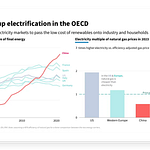Three news stories summarized & contextualized by analytic journalist Colin Wright.
Virgin Atlantic wins UK permit for 100% sustainable fuel transatlantic flight
Summary: On November 28, Virgin Atlantic will fly a plane from London to New York using 100% sustainable aviation fuel, marking the first such journey using such fuel.
Context: Sustainable aviation fuel, or SAF, makes use of waste oils like cooking oil to reduce emissions substantially, and though it’s currently blended with conventional oils in the aviation industry, reducing emissions a tiny bit, the ambition is to produce and deploy SAFs more broadly, allowing aircraft to decarbonize without having to somehow convert entire airline fleets to electric versions of the same—something that’s currently not viable because of the nature of contemporary battery technologies; SAF accounted for only .5% of aviation fuels used in 2021, in part because it currently costs somewhere between three- to five-times as much as typical fuel, but the majority of airlines have set a goal of around 10% SAFs by 2030, and the stretch-goal of net-zero emissions for the industry by 2050 would necessitate about 65% of all aviation fuel moving over to SAF.
—Reuters
A man with Parkinson's who was unable to walk without falling can now do so thanks to a spine implant
Summary: A 62-year-old man living near Bordeaux, France who has lived with Parkinson’s disease for nearly three-decades can now take long walks and climb stairs for the first time since his diagnosis thanks to a device implanted in his spinal cord.
Context: Parkinson’s is a degenerative disease that, among other effects, can cause those afflicted with it to go rigid and experience significant and debilitating tremors, messing with their ability to balance, walk, and otherwise independently function; this device stimulates weakened sensory fibers in the leg muscles, allowing them to activate more predictably; the patient’s walking reportedly improved almost immediately, and after several weeks of rehab it was essentially back to normal; this device is still in the proof-of-concept phase, and if things continue to go as well as they have so far, the makers say it could be commercially available in five to ten years, though you really don’t want to make any mistakes when it comes to something that will be implanted in someone’s spine, so it could take longer.
—Insider
Pakistan starts mass deportation of undocumented Afghans
Summary: The Pakistani government has started a long-anticipated mass roundup and deportation of Afghans living within their borders illegally, many of whom fled across the border when the Taliban re-took control of Afghanistan in August of 2021.
Context: This is a major effort, and it follows a period in which people were allowed to voluntarily leave without legal consequence that ended about a week ago—a period during which at least 200,000 people returned to Afghanistan on their own; this crackdown is expected to impact nearly 2 million Afghans who are thought to be in Pakistan illegally, without documentation, and this policy of forcibly returning refugees to a country where they might be punished or killed by their government has been criticized by UN agencies and human rights groups, but Pakistan’s government has said they’re doing what they can for the people they’re arresting and sending home, and that this is part of a larger effort to expel illegal immigrants, not an effort to target Afghans, specifically.
—The Guardian
Another month’s worth of climate data, another heat anomaly; October 2023 was officially the hottest October on record, probably due to a combination of long-term temperature norm shifts (caused by human-amplified climate change) and temporary El Niño effects.
—Axios
200,000
Estimated area (in hectares, which is equivalent to around 494,210 acres) of currently palm plantation-laden land in Indonesia that will be converted back into forests, according to the Indonesian government.
Indonesia is the largest producer and exporter of palm oil in the world, and the government has been trying to more assiduously regulate the industry, which has caused all sorts of climate and pollution issues, in addition to widespread tax-dodging.
—Reuters












Share this post